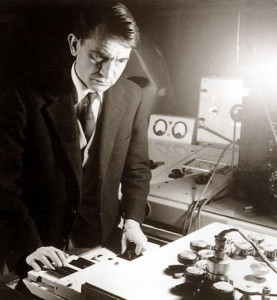
Pierre Schaeffer working with the phonogene in his studio; taken circa 1948 by French photographer Serge Lido.
Pierre Schaeffer, born in 1910, was a french composer, writer, broadcaster, engineer, musicologist and acoustician. He became recognized for his work in electronic and experimental music after World War II. Even though both of his parents were musicians (a violinist and a singer), they discouraged him from pursuing music as a career and had him study engineering instead. After graduating, Pierre took a job at a telecommunications company and then went into broadcasting which then lead him into music. He combined his abilities as an engineer with his passion for sound to experiment in ways that had never been done before.
Schaeffer work at the time was unique because he used real world sounds to create his “concrete music”, he manipulated sound to compose original pieces and he emphasized the importance of improvising while playing or composing music.
As a writer, Schaeffer wrote both fiction and non-fiction. To see a list of his works you can see his bibliography.

Sources:
Kennedy, Michael (2006), The Oxford Dictionary of Music, 985 pages, ISBN 0-19-861459-4
“Pierre Schaeffer”. Encyclopædia Britannica: ¶2. Retrieved 4 December 2008. “Schaeffer taught electronic composition at the Paris Conservatory from 1968 until 1980. His writings include novels, short stories, and essays, as well as theoretical works in music, such as À la recherche d’une musique concrète (1952; ‘In Search of a Concrete Music”‘), Traité des objets musicaux (1966; ‘Treatise on Musical Objects’), and the two-volume Machines à communiquer (1970–72; ‘Machines for Communicating’).”
“Pierre Schaeffer & Pierre Henry: Pioneers in Sampling”. Unknown author (reproduction via Diliberto, John 2005: Electronic Musician) 1986: Electronic Musician. Retrieved November 19, 2015.





